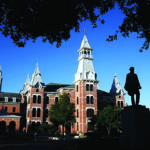WACO—Baylor University’s faculty, alumni and students want a vote in choosing the school’s next president, according to statements approved by representative bodies of each group.
The Baylor Faculty Senate, the Baylor Alumni Association and Baylor Student Government each passed resolutions in recent weeks urging the schools’ board of regents to include faculty, staff, alumni, students and other constituencies as voting members of the presidential search committee.
The chair of the regents expressed his hope that the presidential search committee would take seriously the suggestions of “the various members of the Baylor family,” but he added the responsibility of choosing a president—“and the method by which a president is selected”—belongs to the board.
Voting rights
“It would be inappropriate for me to promise ‘voting rights’ to any party outside the Baylor board of regents,” Regents Chair Howard Batson wrote in a statement to Faculty Senate Chair Georgia Green. He noted the board was “looking at best practices for presidential searches.”
In an interview, Batson, pastor of First Baptist Church in Amarillo, explained the board had examined at least 20 “peer and peer-plus” universities, and no single definitive model exists for conducting a presidential search.
"There’s not one best way or recommended way,” he said.
After the regents' meeting Nov. 1, Batson said the regents took no action regarding the appointment of a presidential search committee.
"We believe our interim president and interim provost are doing a good job, and we don't feel any need to be in a hurry," Batson said in a phone interview.
Sign up for our weekly edition and get all our headlines in your inbox on Thursdays
Batson again underscored the committee's research showed no single definitive process used by the best universities for a presidential search. He indicated the process Baylor followed in the last presidential search—an all-regent search committee working in consultation with non-voting advisory committee representing different university constituencies—is within the bounds of accepted practice.
However, he noted no regent action, and he said no timetable is attached to the search process.
Baylor’s Faculty Senate adopted a resolution at its Sept. 9 meeting. The Baylor Alumni Association followed suit on Oct. 11, and Baylor Student Government approved a similar statement Oct. 23.
The resolutions indicate the degree of disunity that has plagued Baylor over the last five years.
Robert Sloan stepped down as Baylor University’s president in 2005. During the last two years of his presidency at Baylor, the Faculty Senate twice gave him “no confidence” votes, and the regents voted three times on Sloan’s continuing employment.
About nine months after Sloan and the regents agreed to the terms of his departure, the board unanimously elected John Lilley as president. Lilley had earned two degrees from Baylor, but he had been away from Texas 40 years. The board of regents fired him this July, halfway through his contract, for failing to “bring the Baylor family together.”
In its recent resolution regarding the presidential search, the Faculty Senate commended the regents for their efforts “to unify the Baylor University community” by seeking input from faculty and other constituencies in naming David Garland as interim president and Elizabeth Davis as interim provost.
The alumni association resolution included a similar statement. The student resolution noted faculty and alumni were consulted regarding the interim provost and president positions, but Baylor Student Government did not have the opportunity to offer any input.
"Transient leadership"
The Faculty Senate resolution also stated, “Baylor’s standing in the larger academic community and its ability to raise institutional funds has been significantly hampered by transient leadership, perceptions of disunity and perceptions of nonstandard procedures and searches.”
When regents initiated the search that led to Lilley’s hiring, they involved two groups—a search committee make up entirely of regents and an advisory committee that included representatives from the school’s various constituencies. Members of the advisory committee met with the search committee and participate in some candidate interviews, but they did not have voting rights.
The Faculty Senate resolution urged the regents to follow the models of “America’s best universities” where the presidential search process is characterized by full faculty participation with voting rights, along with full the participation of students, staff and alumni.
Specifically, the Faculty Senate resolution called on the regents to form a search committee in which faculty representatives would serve with full voting rights and the balance between regents and faculty on the committee would reflect “best practices at other leading universities.”
The resolution also called on regents to include on the search committee as voting members duly elected representatives of “Baylor’s other constituent bodies,” specifically mentioning not only the student body and alumni, but also the Baptist General Convention of Texas.
In their statements, the Baylor Alumni Association and Baylor Student Government voiced support for the Faculty Senate’s resolution.
A call for transparency
The alumni and student resolutions included calls for openness and transparency. The Baylor Alumni Association statement noted a call in the most recent issue of the Baylor Line alumni publication “in favor of open communication and greater transparency of governance.” Regent meetings are closed to the media and the public.
Batson issued a written statement in direct response to the Faculty Senate resolution.
“I am certainly grateful that the faculty recognizes the board of regents’ attempts to rech out to them and take their input seriously. The goodwill between the faculty and the board is much better than I have experienced in many years,” Batson said.
Citing the Southern Association of College and Schools accrediting agency, he noted “that the selection of the president properly resides with the board.”
However, he noted the board was examining “best practices” for presidential searches.
“Of course, we will not be bound to any one model but will consider both what Baylor has done in the past, as well as models from other universities,” Batson said.
The board of regents “would like to continue to strengthen its relationship with all members of the Baylor family,” he concluded.














We seek to connect God’s story and God’s people around the world. To learn more about God’s story, click here.
Send comments and feedback to Eric Black, our editor. For comments to be published, please specify “letter to the editor.” Maximum length for publication is 300 words.